An estimated 8.6 million watch Democratic debate
By the numbers
Welcome to Trail Guide, your daily host through the wilds of the 2016 presidential campaign. It's Sunday, Nov. 15, and this is what we're watching:
- Hillary Rodham Clinton seeks to recast Wall Street comments
- Meanwhile, Clinton, Bernie Sanders and Martin O'Malley gathered in Des Moines on Saturday night for a debate heavy on foreign policy in the wake of terrorist attacks in Paris
- An estimated 8.6 million people tuned into the debate , reports The Times' Steven Battaglio
- Former Florida Gov. Jeb Bush , who is looking to climb in the polls after last week's debate in Milwaukee, joins NBC's "Meet the Press" where he talked about a no fly-zone in Syria
- Read this roundup of the #DemDebate in Iowa
Column: Democrats not offering much 'debate,' since they mostly agree on issues
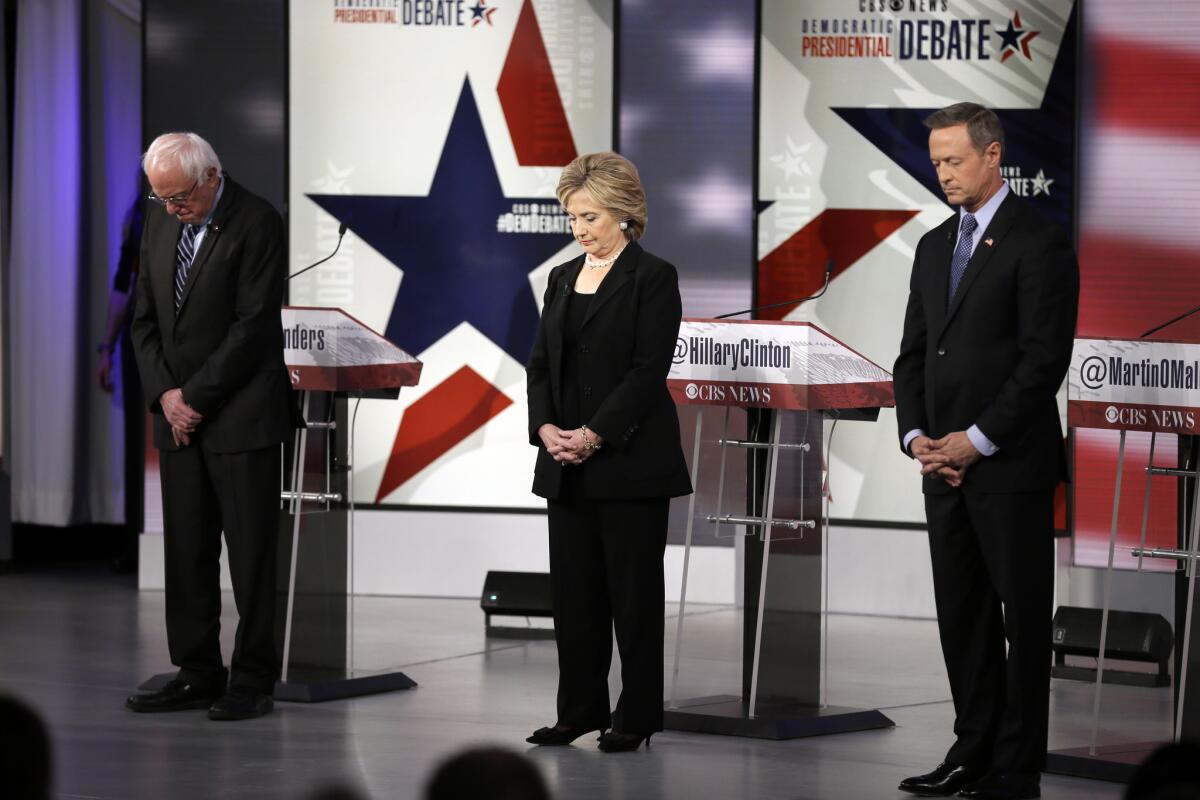
Democratic presidential candidates Bernie Sanders, left, Hillary Rodham Clinton and Martin O’Malley take a moment of silence for those killed in the Paris attacks before the second Democratic presidential debate, in Des Moines, Iowa.
Initially solemn, typically wonkish and monotonously polite to the moderators and one another, the three Democratic presidential candidates still managed to provide a few surprising moments during their second debate Saturday night.
Hillary Rodham Clinton complimented George W. Bush and accused Bernie Sanders of impugning her integrity.
Martin O’Malley called Clinton “Annie Oakley” on gun control and “weak tea” on big banks.
Sanders founded yet another T-shirt line by announcing that “Wall Street’s business model is fraud,” CBS used Twitter in a way that did not look like old-media floundering, and Dwight D. Eisenhower continued his 2016 Greatest Hits Tour.
A week after Donald Trump praised Ike for deporting more than a million Mexicans, Sanders offered him as a model of high tax rates for the rich: “I’m not much of a socialist compared to Eisenhower,” he said.
Most important during the debate, however, was the moment that did not occur: Though the candidates were resolute in their condemnation of ISIS, none of them were inflammatory or went ballistic.
Democratic debate nets 8.6 million viewers ... on a Saturday night
The second Democratic primary debate, which was held in Des Moines, pulled in a respectable audience of 8.6 million viewers to CBS on Saturday.
The number from Nielsen isn't as spectacular as previous debates, which pulled in record audiences for CNN, CNBC, Fox News Channel and Fox Business Network. But Saturday night typically has the smallest TV audience of the week, and there is barely any habitual viewing of the broadcast network outside of sports telecasts.
The network's debate coverage, which aired from 9 to 11 p.m. ET, was the most-watched program of the night. Among Democratic debates televised since 1996, it ranks fourth. The first 2016 Democratic primary debate, which pulled in 15 million viewers for CNN on Oct. 13, ranks first. Fox News Channel's Aug. 6 Republican primary debate was the most-watched contest for either party, with 24 million viewers.
Earlier this month, John Kasich played golf while on the campaign trail in New Hampshire.
Jeb Bush, Hillary Clinton differ from Obama on Syria's no-fly zone
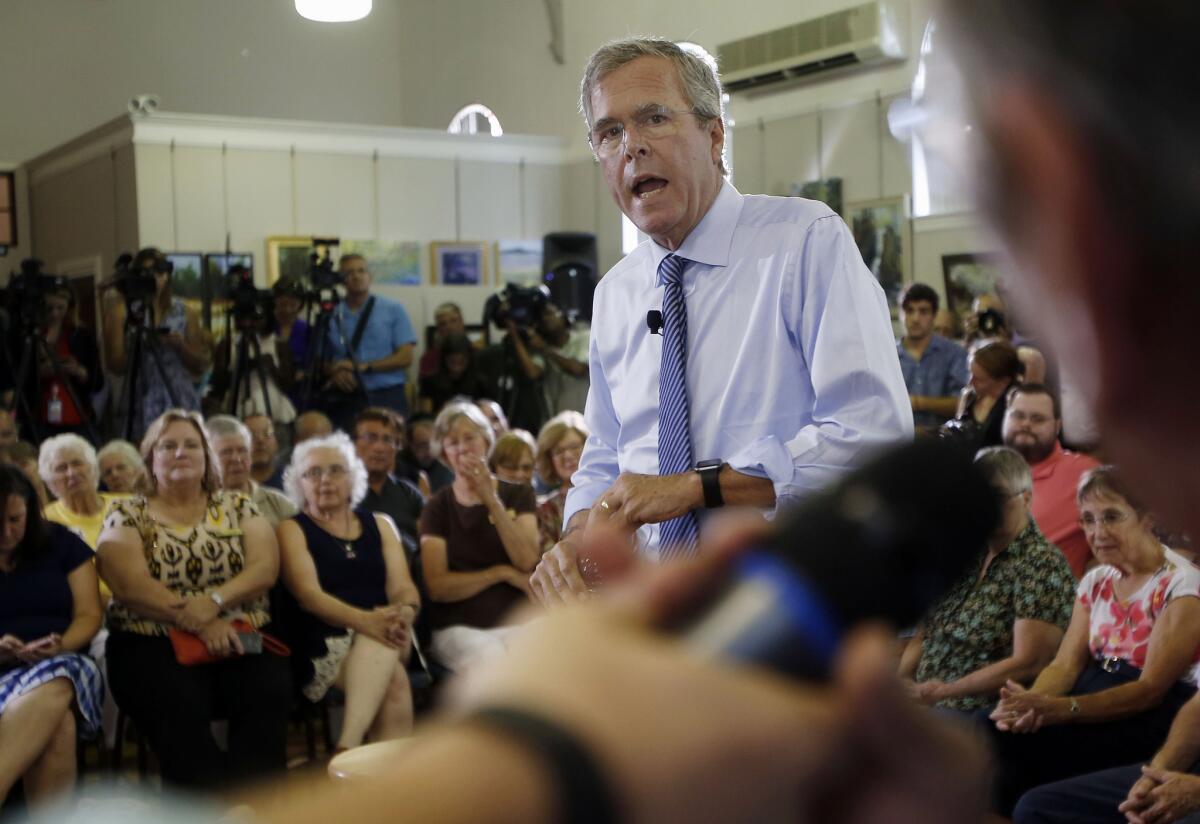
As governor of Florida, Jeb Bush offered generous subsidies to lure the Scripps Research Institute to expand in the state, but the economic benefits he predicted have yet to come to fruition.
Similarities between Hillary Rodham Clinton and Jeb Bush when it comes to ideology are rare.
But as both compete for their party’s nomination, the question of how to deal with the ongoing civil war in Syria has revealed similarities between the two candidates.
When speaking on NBC’s “Meet the Press” on Sunday, Bush was direct in his views on what President Obama must do to combat Islamic State terrorists in Syria.
“Declare a no-fly zone over Syria,” he said. “That's what I want him to do. I want him to lead. He has the capability of doing this. We have the resources to do this. This is a threat to Western civilization and we should consider it that way.”
Bush, who has struggled to gain traction in his quest for the Republican presidential nomination, also noted the need to arm Kurdish forces in Iraq as they battle Islamic State, another area of general agreement among GOP candidates. So far, the Obama administration has provided arms to Kurdish forces, but a no-fly zone has been rejected.
“We all want to try to relieve the suffering in Syria, but my job is to make sure that whatever we do, we are doing it in a way that serves the national security interests of the American people, that [it] doesn't lead to us getting into things that we can't get out of, or that we cannot do effectively,” Obama told reporters last month.
But Clinton, who served under Obama as secretary of State, has called for a no-fly zone too. Clinton told reporters recently a no-fly zone would “stop the carnage on the ground and from the air.” Moreover, she supports arming those who “take the fight" to Islamic State, such as Kurdish forces.
“What the president has consistently said-- which I agree with-- is that we will support those who take the fight to ISIS,” she said Saturday, using another term for the militant group. “ That is why we have troops in Iraq that are helping to train and build back up the Iraqi military, why we have special operators in Syria working with the Kurds and Arabs so that we can be supportive. But this cannot be an American fight, although American leadership is essential.”
The attacks on Paris last week are certain to dominate discussion on the campaign trail over the next several weeks.
Clinton campaign recasts Wall Street remarks
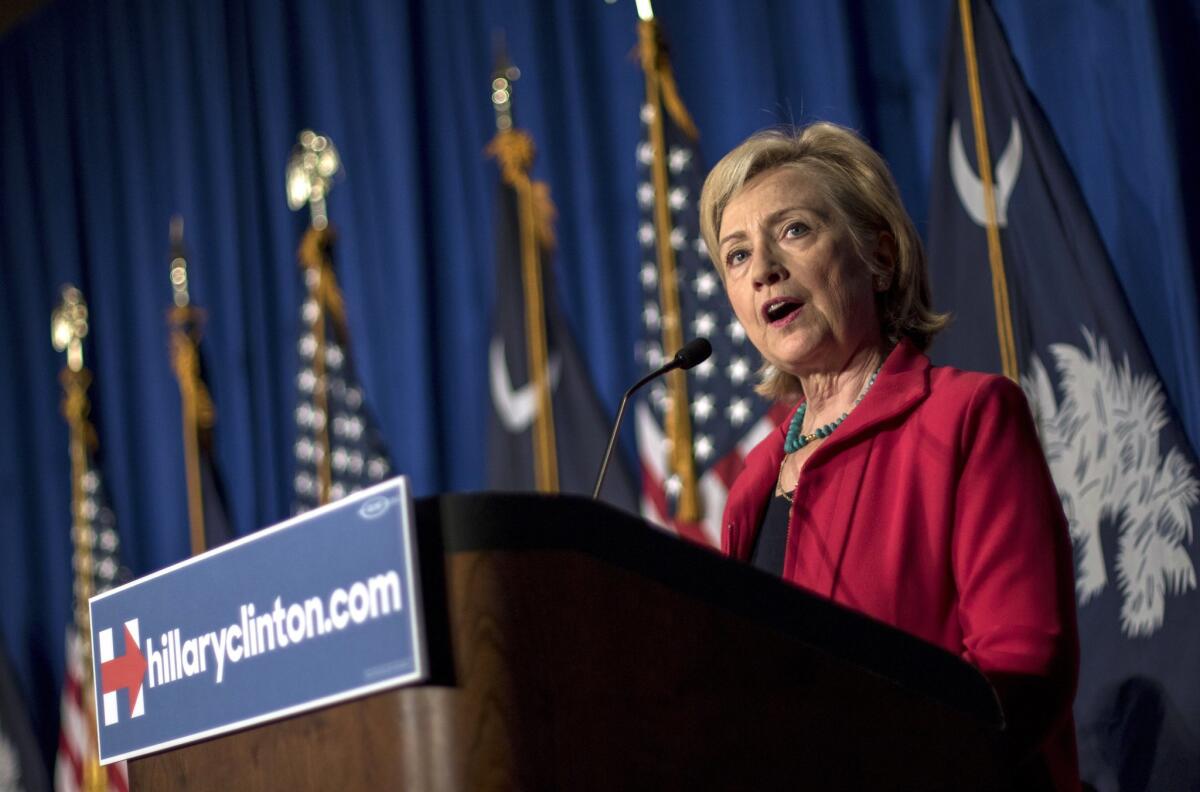
Democratic presidential hopeful Hillary Rodham Clinton speaks July 22 at a campaign event in Columbia, S.C.
If there was one thing Hillary Rodham Clinton said during Saturday night's debate that she regrets, it was most likely her defense of the campaign cash she gets from Wall Street.
She suggested the support was rooted, in part at least, in the work she did helping lower Manhattan recover from the 9/11 attacks. "I did spend a whole lot of time and effort helping them rebuild; that was good for New York, that was good for the economy," Clinton said.
The remarks were rebuked on social media.
The comment of one critic who was incredulous that Clinton invoked the terrorist attacks in defending her relationship with Wall Street was even read to Clinton during the debate.
Just before Clinton took the stage at a Democratic BBQ here Sunday, her communications director, Jennifer Palmieri, sought to clarify Clinton's controversial comment.
"There are times where she has represented New York and there's times where she's helped Wall Street," Palmieri said. "She's particularly proud of the work she did there after 9-11 and there's times she's disagreed with them. The point is that she noted -- stepping back beyond the specifics about Wall Street -- there are people who have supported her and sometimes they agree with her on all things. And often, they don't. But they appreciate how hard she works and they find other reasons to support her. But it has not -- it's pretty clear where she stands on issues, and donations do not play a role."
Asked whether the line was planned, she said "the debate happens in real time."
It's not just Clinton's critics who have been shaking their heads over the stumble.
"I don't think that was the finest moment of the debate," Democratic strategist Stephanie Cutter said on ABC News This Week Sunday. "And I think she's going to have to answer to that."
Cutter said there were better ways for Clinton to have handled the question.
"You know, getting into a position of defending Wall Street is a problem for her. What she simply should have said is yes, Wall Street is giving me money," Cutter said.
"Could you point to anything that I have done because of that money?"
And at least one person has not been satisfied by the campaign's effort to explain the whole incident. Iowa law professor Andy Grewal, whose tweet was read at the debate, was dismayed to see the campaign blaming his misinterpretation of Clinton's Wall Street remarks for the gaffe.
On Sunday he tweeted again: "Is the Clinton camp coming after me?"
Ben Carson attends Las Vegas church service, mentions Donald Trump
'Boots on the ground' and other highlights from Democratic debate in Iowa
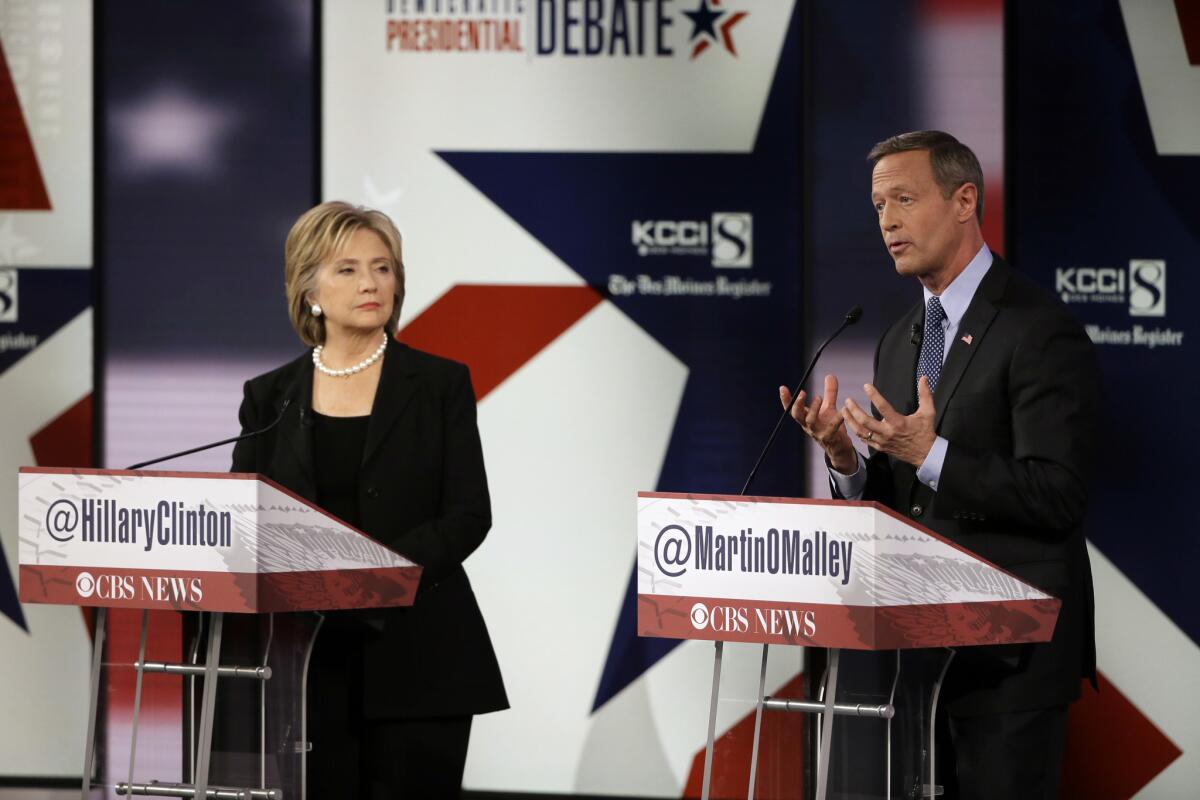
Martin O’Malley makes a point as Hillary Rodham Clinton listens during a Democratic presidential primary debate, Saturday, Nov. 14, 2015, in Des Moines, Iowa. (AP Photo/Charlie Neibergall)
When Democratic presidential hopefuls arrived on stage Saturday night at Drake University in Des Moines, the terrorist attacks in Paris a day earlier not surprisingly dominated the debate. While the discussion touched on domestic issues, it was heavy on foreign policy.
Here are three key moments from the debate that separated the candidates:
Hillary Rodham Clinton’s 2002 vote in support of the Iraq war
In the wake of the Sept. 11, 2001 terrorist attacks, Clinton was a a first-term senator from New York who voted in support of the U.S. invasion of Iraq.
But some members of Congress rebuked the idea of sending U.S. troops to fight the country’s leader, Saddam Hussein.
Sen. Bernie Sanders, who was then serving in the House, voted in opposition to the Iraq war.
Now, as Clinton and Sanders compete for the Democratic presidential nomination, the issue has come to the forefront in the past two debates. Moreover, it dogged Clinton’s failed 2008 presidential campaign as then-Sen. Barack Obama, who later appointed Clinton secretary of State in his administration, consistently assailed her on the vote.
On Saturday, Sanders called the invasion, which left thousands of American troops dead and found no evidence that the Middle East country was building weapons of mass destruction, "one of the worst foreign policy blunders in the modern history of the United States.”
“I would argue that the disastrous invasion of Iraq, something that I strongly opposed, has unraveled the region completely. And led to the rise of Al Qaeda and to ISIS,” he said. “I don't think any sensible person would disagree that the invasion of Iraq led to the massive level of instability we are seeing right now.”
Bernie Sanders' record on gun control
In 2005, Sanders supported the Protection of Lawful Commerce in Arms Act (PLCAA), which protects gun manufacturers and sellers from lawsuits that hold them liable for dealing in firearms that end up in criminal hands.
“That was a terrible mistake. It basically gave the gun lobby even more power to intimidate legislators, not just in Washington but across the country,” Clinton said Saturday.
When pressed during the debate if his vote was a mistake, Sanders demurred repeatedly and said at the time there were elements of the bill he supported.
In the wake of the mass shootings in 2012 at an Aurora, Colo., movie theater, Sandy Hook Elementary in Newtown, Conn., and more recently an Oregon Community College, gun control has become a polarizing issue. While Democrats have called for tougher reforms, Republicans have said more laws will infringe on the 2nd Amendment rights of gun owners.
Martin O’Malley “boots on the ground” statement
When both Republican and Democratic presidential hopefuls talk about U.S. military intervention abroad, they often note whether or not it is best to put “boots on the ground.”
Well, former Maryland Gov. Martin O’Malley, who is polling around 3% in the Democratic presidential primary, wants that rhetoric to change.
On Saturday, he made his mark by telling the story of a mother from Burlington, Iowa, about 75 miles south of Davenport, who urged him and other candidates to stop using the term “boots on the ground,” because her son is “not a pair of boots.”
“These are American soldiers and we fail them when we fail to take into account what happens the day after a dictator falls,” he said, later noting the need to do more for veterans returning from overseas.
Analysis: As a former secretary of state, Clinton finds foreign policy strength after Paris attacks
An unsettling yet telling split-screen changed the view of the presidential campaign Saturday night: Three Democratic candidates who had come to Iowa to talk about domestic issues found their debate hijacked by a foreign policy crisis dominating the news from a world away.
As metaphors for the last two presidencies go, the turnabout was apt: Both George W. Bush and Barack Obama came into office with domestic issues prime on their minds, only to have conflicts abroad hobble and frustrate their tenures.
Foreign policy, and specifically her vote for the Iraq War, also frustrated Hillary Rodham Clinton in her unsuccessful run for president in 2008. Not even an ad that year asserting that she was most experienced to take the 3 a.m. crisis call—the implication being that Obama wasn’t—was enough to overcome Democrats' embrace of his early opposition to the war.
As much as anything, Saturday night's debate in the shocked aftermath of the Paris terrorist attack offered Clinton an opportunity to argue anew that her experience is necessary—and her opponents' is insufficient--for any 3 a.m. call. That allowed her to eclipse her rivals on stage, although in doing so, she may have created vulnerabilities a Republican could exploit next fall.
Clinton dominated speaking time in debate
As with nearly all candidate debates, who "won" will always be in contention, but there's no question who spoke most -- the front runner, Hillary Rodham Clinton.
Debate moderator John Dickerson of CBS kept the questioning close to even between Clinton and her chief rival, Sen. Bernie Sanders -- 25 queries to her, 24 to him, according to a tally by the Associated Press. But Clinton spoke about 16% more than Sanders.
Clinton's speaking time grew in part because both Sanders and the third candidate, Martin O'Malley, the former governor of Maryland, attacked her. That gave her additional time to respond.
In all, Clinton spoke just under 28 minutes in the two-hour debate, according to the AP count. Sanders spoke 24 minutes. O'Malley, who trails badly in the polls and got the fewest questions, 19, held the floor for just over 18 minutes.
Clinton's Iraq war vote under the spotlight in Democratic debate
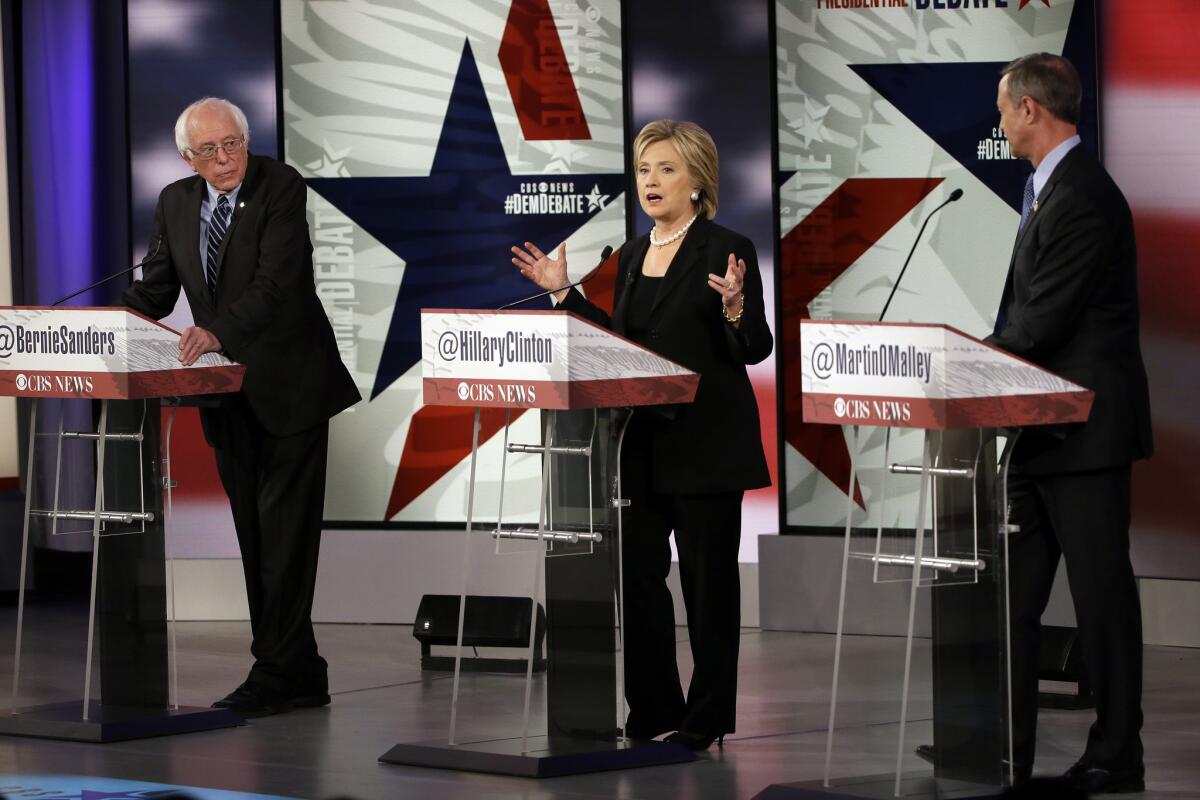
Hillary Rodham Clinton speaks as Bernie Sanders, left, and Martin O’Malley listen during a Democratic presidential primary debate, Saturday, Nov. 14, 2015, in Des Moines, Iowa. (AP Photo/Charlie Neibergall)
By the numbers
Get the L.A. Times Politics newsletter
Deeply reported insights into legislation, politics and policy from Sacramento, Washington and beyond. In your inbox three times per week.
You may occasionally receive promotional content from the Los Angeles Times.







